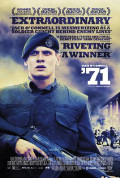
Directed by
Yann Demange
90 minutes
Rated M
Reviewed by
Chris Thompson

71
Synopsis: It’s 1971 in Belfast at the height of the ‘The Troubles’. Just-out-of-training British soldier, Gary Hook (Jack O’Connell) gets left behind by his unit after a search for weapons in a residential street escalates into a riot. Lost in ‘enemy territory’ and unsure about who to trust and who to fear, Hook attempts to make his way back to the barracks and, as he does, discovers that the ‘war’ he’s fighting isn’t quite as unambiguous as he might have thought.’71 is a remarkable first feature from Yann Demange whose previous work includes the darkly humorous short film, Incomplete (2006), and the simple but thought-provoking short doco, Headspace (2008) – you can find both films online.
’71 is a superbly paced, suspenseful thriller that throws the audience right into the thick of things thanks to the up-close-and-agitated hand-held camera work of Tat Radcliffe. Whilst there are many films where this style is frustrating and alienating, here it adds to the sense of fear and confusion in both the riot scenes and the scenes where Hook is being relentlessly pursued through the back-streets of Belfast. This camera style combines with David Holmes evocative soundtrack and Scottish playwright, Gregory Burke’s taut screenplay to get the head thinking and the heart pounding as we follow the desperate soldier through this one, very long night.
O’Connell (recently seen in Angelina Jolie’s Unbroken) gives a riveting and layered performance as he struggles to come to terms with the geographical and political landscapes of his situation. He is well matched by a relatively young cast who embody the complexity and contradictions of the story creating a palpable tension between those characters for whom the end justifies the means, no matter the cost in human life, and those for whom the struggle is tempered either by their pragmatism or their sense of humanity. Most notable here are David Wilmot as old school IRA boss, Boyle; Sean Harris as the duplicitous British undercover soldier, Browning; and Barry Keoghan in an outstanding supporting role as the conflicted Irish teenager whose commitment to the cause is hampered by his hesitation to cross the line between soldier and killer. The uncertainty and ambiguity of this ‘war’ (as it is described on more than one occasion) is compounded by the internal power struggles and ideological differences within this three-cornered conflict between Orange, Green and Brit.
As the title suggests, this is a period piece, but the tenor of the 70s is imbued through the film in subtle ways rather than through show-offy production design. Unobtrusive choices for hair, costumes and decor capture the period perfectly and the most overt reference is in a moment of well placed humour – a David Bowie song playing on the radio elicits the response, ‘...he’s for girls, isn’t he?’
There are some similarities here with the early scenes of Jim Sheridan’s 1993 film, In The Name Of The Father, but for me, the real parallel is with Carol Reed’s excellent 1947 film, Odd Man Out in which James Mason plays the hunted figure being chased through troubled city’s underbelly. Whilst Demange’s skill as a film-maker may well match Reed’s, he has the added advantage of almost seventy years of advances in camera and sound editing technology to bring to the mix. But the film doesn’t rely on these things; they are just the icing on a cake that’s made from great storytelling, great performances and great film-making technique.

Want more about this film?


Want something different?




